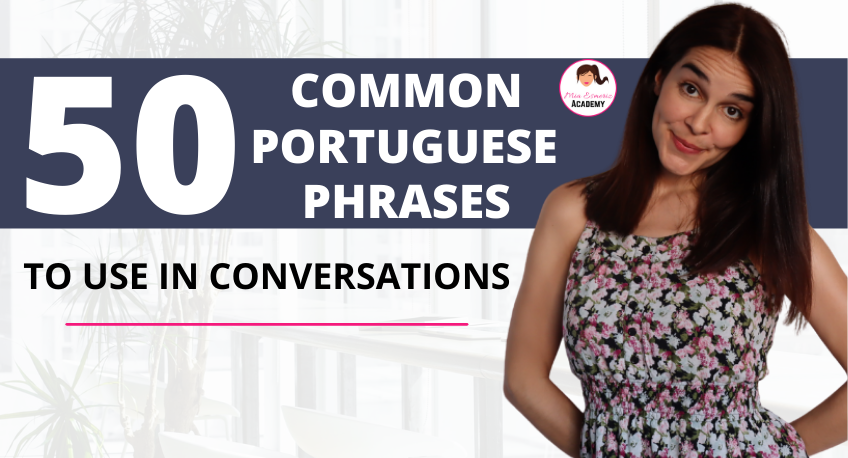In this post, you will learn 50 Common Portuguese Phrases (50 Frases Comuns Em Português) that you can use in your conversations.
I also created a YouTube video about these useful phrases in Portuguese. You can watch it here:
Do you want to be notified when I post my next video on YouTube? Subscribe to my YouTube Channel here.
So, first, let’s start with some common Portuguese phrases to ask how someone is:
1 – The first phrase is:
Como estás? Ou Como está? – How are you? (informal) or How are you? (Formal)
This is the most common phrase of all and “como estás” is more informal and we use it with people that we know, while “como está” is more formal, and we use it with people that we don’t know so well or that are older than us or that are in a hierarchical position above ours.
2 – The second phrase is:
Então, tá tudo? – Hey, what’s up?
This phrase is much more informal and probably if you use it this way, you are going to get a very informal reply too.
3 – The third phrase is:
Como vão as coisas? – How are things?
Here we ask how the life of the person is going in general. How everything is.
4 – A variation of this phrase can be:
Como vais? ou Como Vai? – How are you going? (Informal) or How are you going? (Formal)
Here we have the more informal and the more formal versions again.
5 – Another variation can also be:
Como vai tudo? – How is everything?
6 – Or even:
Como vai a vida? – How is life going?
7 – A more formal version to ask that can be:
Como tens passado? – How have you been? (Informal)
8 – Or even more formal:
Como tem passado? – How have you been? (Formal)
9 – If we are speaking to friends, we can also say:
O que tens feito? – What have you been up to? (Lit. What have you been doing?)
This is a very informal way to ask how someone is. So, it is more common to use it with friends or people we know.

Now let’s see some common Portuguese phrases to answer this question, to say how we are:
10 – The most common phrase of all is:
Estou bem, obrigado/obrigada. E tu? – I am fine, thank you. And you?
11 – Or a bit more formal:
Estou bem, obrigado/obrigada. E o senhor? E a senhora? – I am fine, thank you. And you? (Formal)
12 – If you are so-so, not very well, not very bad, you can say:
Estou ok! – I’m ok!
13 – Or:
Estou benzinho. – I’m ok-ish.
14 – You can also say:
Vai-se andando… – Things are going…
This means that things are ok. They could be worse, so, all good.
15 – If nothing has changed, since the last time you saw the person, you can answer:
Está tudo na mesma. – It’s all the same.
16 – If things are not so good, you can say:
Não muito bem, infelizmente. – Not very well, unfortunately.
17 – If everything is going very well, but you don’t want to show it too much, you can say:
Não me posso queixar! – I can’t complain.
If you want to know more about how to answer to “How are you?” in Portuguese, you can check out this blog post, or the following YouTube video:
Now, here are some common Portuguese phrases to thank somebody. The most common one is:
18 – Obrigado ou Obrigada. – Thank you.
We use obrigado (ending in o) to thank if we are a man and obrigada (ending in a) if we are a woman. In my case, I say obrigada (ending in an a). You can read this article or watch this video where I explain everything about saying thank you in Portuguese.
19 – If you want to be more emotive, you can add a very and say:
Muito obrigado. ou Muito obrigada. – Thank you very much.
20 – Another sentence to thank someone is:
Agradeço-lhe imenso. – I appreciate it (lit. I thank you so much)
This one is a bit more formal.
21 – Another phrase also pretty formal is:
Fico-lhe grato ou Fico-lhe grata. – Appreciate it!
22 – We can also simply say:
Grato! ou Grata! – Appreciate!
23 – There is still another very common way which is:
Obrigadíssimo. / Obrigadíssima. – Thank you so much.
24 – Or:
Obrigadadinho. / Obrigadinha. – Thank you so much.
When you want to answer someone that thanks you for something, there are also some ways:
25 – De nada. – You are welcome.
This is the most common way of answering someone that thanks you. It always has this form, it doesn’t change.
26 – Não te preocupes! – Don’t worry about it!
This way of saying you’re welcome is more informal and we use it more with friends and people we know well.
27 – If you want the more formal version of this phrase, you can do it like this:
Não se preocupe! – Don’t worry about it! (Formal)
28 – A very formal phrase as well is:
Não tem que agradecer! – You don’t have to thank me!
With this phrase, we are telling the other person that they don’t need to thank us, because the pleasure was ours to help them.
29 – This takes me to the next phrase:
Foi um prazer ajudar. – It was a pleasure to help.

Now, let’s see how you can ask for information about something:
30 – Desculpa, sabes como…? – Excuse me, do you know how…?
For example, “Excuse me, do you know how I can speak to Prof. Mario?”
31 – Desculpa, sabes-me dizer onde…? – Excuse me, can you tell me where…?
For example, “Excuse me, can you tell me where the bathroom is?”
32 – Or even:
Desculpa, fazes ideia de como posso…? – Excuse me, do you have any idea how I can…?
We can change the word that comes after: we can say “do you know how” or “do you know where” or “do you know why” for example, depending on the context and on what we want to ask.
Now, if someone asks you something and you want to answer, there are many ways. If you don’t know the answer, you can say:
33 – Não sei. – I don’t know.
This is the most common way of all to say that we don’t know something. But, since it is used too much, there are some alternatives:
34 – Não faço ideia. – I have no idea.
35 – Or even more informal:
Não faço a mínima (ideia). – I have no idea (lit. I don’t have the minimum idea)
36 – Another way to answer when we don’t know is:
Não tenho a certeza. – I am not sure.
If, in a conversation, you want to agree with someone, you can say:
37 – Pois! – Right!
This word is used for a lot of things, but mostly it is used when we want to agree with the other person, or at least when we want the other person to think we agree with them.
38 – When someone is telling us something that happened, for example, and they say “She should have come to the party”, we can simply nod our heads and say “right”.
Pois é! – Right!
This phrase is a variation of the phrase before and it means the same.
39 – Tens toda a razão. – You are right.
Here we are spelling out that the other person is right.
40 – If we want to speak more formally we can use the third person:
Tem toda a razão. – You are right. (formal)
41 – A more formal phrase is:
Concordo! ou Concordo plenamente! – I agree! or I totally agree!
If, on the other hand, we don’t agree with what is being said, we can use the following phrases:
42 – Desculpa, mas não concordo. – I am sorry, but I don’t agree.
The sorry here helps to minimise the impact and the conflict. At least we hope so…
43 – Aí não estamos de acordo. – We don’t agree there. (lit. There we are not in agreement)
This is another way of disagreeing with someone.
44 – We can also simply say:
Discordo. – I disagree.
45 – Infelizmente, temos pontos de vista diferentes. – Unfortunately, we have different points of view.
This is yet another way to say to the other person that we don’t agree with what is being said.
Finally, if we want to say goodbye to the other person or finish the conversation, we can say:
46 – Adeus! – Goodbye!
Truthfully, this phrase is not the most used one, although it is the most known word to say goodbye to someone and the one that you can find in the dictionay.
47 – But other words are more commonly used. For example:
Xau! Ou Tchau! – Bye!
48 – Até à próxima! – See you next time!
Here we are counting on seeing the other person again.
49 – Prazer em vê-lo. – Pleasure to see you.
This sentence is quite formal, but it is used regularly.
50 – Cumprimentos lá em casa! – Greeting to the family! (lit. Greetings at home!)
Here we are saying to the person that we remember their family, so we send them our greetings. It is something that we consider nice and it is common to hear it.
And these were some of the most common Portuguese phrases when we are having a conversation. Have you heard any of these? What is your favourite one? Let me know in the comments below.
I hope that you have enjoyed this article and that you use these phrases when you are having a conversation in Portuguese.
Beijinhos,
Mia


Really appreciate all the work you have done to benefit others.
Thank you for your positive feedback 🙂